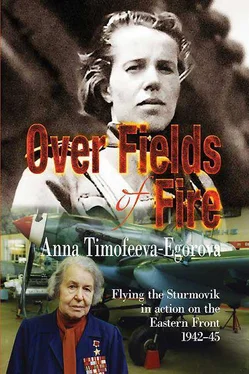Units raised from the troops to maintain order played a paramount role, but an ‘amusing incident’ took place as well. Between Pyatigorsk and Nal’chik the Fascists again shot down Serezha Spirin’s plane, which was flying to locate the 17th Cossack Cavalry Corps. The August heat was on, and the pilot had taken off in just light overalls, leaving his uniform with his papers back at the aerodrome. He was shot down, the plane burned up, the pilot was injured too. Firing on the ground didn’t give him a chance to lift his head. Spirin crawled. When he reached our lines he was immediately arrested as a deserter. No matter what he tried to say to vindicate himself nobody would believe him. Fortunately, a Front HQ liaison officer, with whom Spirin had flown to the fighting units many a time recognised him. The speedy court martial was postponed, and Commissar Ryabov flew off with confirmations and papers to pick him up.
The front line was changing several times a day. We had to fly all over the North Caucasus. The enemy Panzer units had already forced a crossing over the Kuban in the Armavir Region and captured Maikop and Krasnodar. The Germans had occupied nearly all the mountain passes, taken Mozdok and small bridgeheads on the right bank of the Terek River. It was difficult for us to understand the situation that had developed in the North Caucasus in August 1942. I remember getting an order to locate the headquarters of the 58th Army, again with the same navigator Cherkasov, whom I made a flight from Nal’chik to Grozny with. We found the Army and handed mail over to the Front headquarters but how much we went through during that flight!
I returned from the mission tired, despondent from all I’d seen, angry. I handed the plane over to Dronov and rushed to squadron headquarters. Now behind me I heard the mechanic’s bitter words addressed to the engineer, “Again like a sieve! How I’m going to fix it and what with, I have no idea. There’s no workshop yet…”
Calling in at the command post to report to the Commander of Task Implementation I saw the returned Kolya Potanin and Victor Kravtsov were already reporting. The quiet and sober-minded Potanin didn’t look himself. Always well-kempt and tidy, now he was in a burnt uniform, his face smeared with oil and blood, hair scorched. He was reporting to the squadron commander Major Boulkin and to the executive officer Listarevich about what had happened and asking to be transferred to combat aviation. The following had happened to Potanin: he had been sent with important cargo to the Ardon area, to our units surrounded by the enemy. Many years later Chief Marshal of Aviation Konstantin Andreevich Vershinin — the former commander of our Aerial Army — wrote in his book “The 4th Aerial” about those flights: “Many brave men flew to encircled pockets in the daytime as well”. It seems you couldn’t say it clearer. At daytime, in a defenceless plane, into a surrounded area… The pilots despatched foodstuffs, ammo, medical supplies, other cargo to the troops… That day Potanin, having completed the mission, was transporting a badly wounded man out of the pocket. On the way back he found himself under ground fire and then under fire from Fascist fighters. No matter how well he manoeuvred, how he tried to escape the shells targeted at him, his plane was shot up, caught fire and fell into brush. Potanin managed to leap out under from the burning debris, then, rolling on the ground he put the fire on him down and rushed to save the wounded navigator, but he was already dead…
“I want to smash the bastards!” His eyes sparkling, clear and limpid as the sky, Nikolay was arguing with the squadron commander. “I can’t do it this way any more. They hit us and we hide in the bushes!.”
The Kubanets 91 91 Translator’s note — a man from Kuban, a Cossack-populated area in Southern Russia in the Kuban River basin.
Kravtsov stood silent. Instead of reporting he, still silently, passed a paper of some sort to the squadron commander. I saw him, also soundless, reading it. With no hesitation he wrote something on it in bold letters, and passed the paper to the executive officer. Later we found out that Victor Kravtsov had refused to fly in U-2s and asked to be transferred to the ground-attack aviation. The squadron commander’s reply was the same as many times before: “Denied”…
19. “You want to go to a penal company?”
It was a frightening and difficult time back then, in the autumn of 1942 in the North Caucasus. All fighting men from Private to Field Marshal seemed to be at breaking point. None of us had received any letters for a long time: the field mail had got lost somewhere. How was my mum, how was Victor, where were they? Were they alright? “Of course, they are alive and well!” I would reassure myself: “It’s problems with communications!” In the left breast pocket of my blouse there were my Party membership card and two photographs — my mum’s and Victor’s, and a very tiny one of Yourka. Mum was as usual in a headscarf and looking at me with sorrow. But Victor, on the contrary, was laughing jauntily, slightly throwing back his curly head. He was in uniform. There were three cubes and ‘birds’ on his collar patches. Yourka was in a white shirt with a Pioneer scarf 92 92 Translator’s note — a red scarf — a sign of belonging to the Pioneer organization.
on the photo. They hadn’t wanted to accept him in the Pioneers because of his repressed father until the zavouch 93 93 Translator’s note — head of the teaching unit in USSR schools.
stood up for him and for other similar unfortunate children. She said then: “If we don’t accept our students in the Pioneers we won’t form a single Pioneers group in the whole school. You all know that in our Arbat schools almost every second students’ father has been repressed. Many were then accepted in the Pioneers but after that, true, the zavouch was fired…
In extremely difficult conditions, fighting fiercely, our troops retreated to the foothills of the Greater Caucasus Range. The enemy had occupied a vast territory: the Rostov district, the Kalmykia Republic, Krasnodar and Stavropol Provinces, penetrated into Kabardino-Balkaria, North Ossetia, Chechen-Ingushetia. On 25 October 1942 the Hitlerites threw up to 200 tanks into the battle and having broken through the lines of the 37th Army, they captured Nalchik on 28 October. Exploiting their success, in a week they approached Ordzhonikidze. But on 6 November the incoming reserves of our Army launched a counter-attack against the Fascist grouping and smashed it in six days of fighting. The Germans had gone on the defensive in the direction of Grozny too. The plan to conquer the Transcaucasus, Grozny and Baku oil-producing regions was frustrated.
It was in those very days when my last sortie in the communication squadron took place. I flew to the Alagir area and on the way I was attacked by German fighters. Manoeuvring literally between the treetops, I desperately tried to hide from them. The Messers were firing blindly but with long spiteful bursts. I threw my plane left and right… “When will they finally leave me alone?..” And suddenly… My machine smashed its wing into a tree. A heavy blow… A crack… Another blow!… When I came to my senses I couldn’t understand at all where I was. My legs and arms were sore, my chest was constricted, it was hard to breath. Stirring a little I understood nothing was broken. But where was the plane? I looked around and saw it just nearby: it lay completely destroyed. The engine was stuck into the ground, the propeller (more precisely, fragments of it) was scattered around, the ailerons were hanging on the trees with some other parts. In other words the plane was no more. I felt pain, vexation and bitterness deep inside. “What shall I do? What shall I do…?” I repeated over and over again hobbling towards the aerodrome. There was no proof that I had been attacked by the Germans. I thought: “What if I say I crashed the plane myself. It’ll be a chance to get transferred to the ground-attack aviation!” After all, by that time I had already flown 130 combat flights in the U-2!
Читать дальше












